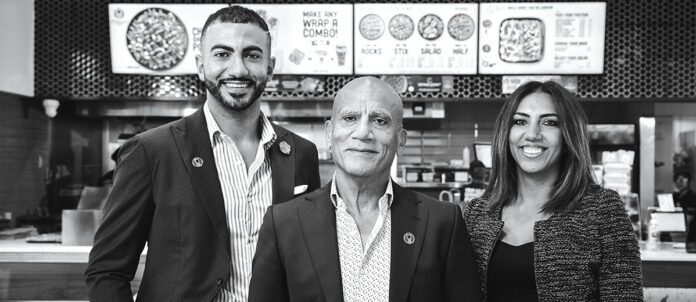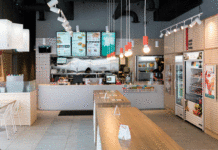
By Laura Pratt
When Sam Osmow brought his family to Canada from Egypt in 1998, they arrived at Toronto’s Pearson International Airport, anxious to begin a new adventure.
He purchased a modest sandwich shop, the Polar Submarine, in a suburb of Mississauga, Ont. and for a while, it paid the bills. But then things took a turn when a tsunami of competition forced the shop to close. When it re-opened, it was a more authentic version of the family — serving their native fare and bearing their name.
Osmow’s Shawarma, Foodservice and Hospitality’s Pinnacle Award winner for Company of the Year, generates more than $140-million in annual sales, employs approximately 1,200 people and is a leader in the QSR segment for its clever marriage of mom-and-pop sideshow and industrialist feature act. As of the end of June 2023, its systemwide sales were $80.5 million, which represents a 36.3-per cent increase year-over-year.
The company ditched subs the day a customer, sniffing the air, asked patriarch Sam Osmow what he was making for lunch. Sam swapped out his store’s standard-issue sandwiches for dishes from his own culture and sent his children out with shawarma samples — and news of their responses heartened Sam about the chance he’d taken.
Ben Osmow, one of the children peddling samples and now Osmow’s CEO and head of Franchising, remembers the looks on people’s faces when they tasted his family’s food. “Wow,” they’d say, their eyes looking for its source. “Where is this from?”
Only a year later, lineups at that first Osmow’s restaurant snaked, and folks made the trip from out of town. Sam pumped the brakes on his children’s sample tour and the family honed in on expansion. They opened two more Ontario restaurants — one in Brampton, one in Mississauga.
At first, Osmow’s resisted franchising, Ben explains, because of the abundance of prep work required for their menu. “We let people convince us,” Ben concedes, and after selling the first franchise in Milton, Ont. in 2015 to a family friend, they sold the next one to a long-time customer. They had no franchise information to offer their business partners; they made their deals with handshakes.
Today, Osmow’s is a master franchisor thanks in part to a central commissary and gutsy marketing. When the company committed to franchising, it established a 40,000-sq.-ft. commissary in Mississauga, where the restaurant’s Middle-Eastern and Mediterranean spices and marinades are made and the proteins are prepared. The restaurants benefit from the economies of scale, and enhanced quality control and management of supply chains. Osmow’s also manages franchisee expenses by absorbing rising food costs and waiving royalties for COVID-depleted operations.
After completing his MBA and working in Toronto, Ben left it all to join his father’s business. “My dad called and said, ‘These franchise applications are piling up.’” It wasn’t a hardship, says Ben, who completed his MBA studies in International Business at the EAE Business School in Madrid, according to his LinkedIn profile because entrepreneurship was a passion and he was “a salesman at heart.” Once the company set up the commissary, “We felt confident we could begin franchising the business.”
To start, Ben sat down with potential landlords and explained why they should take a chance on Osmow’s. Curious outsiders, such as that early fascinated customer, were receptive to the idea of this cuisine, and Osmow’s quickly grew to 50 stores.
It was at this point that Ben saw the expansion ball in his court. Wouldn’t it be cool, he told his sisters, if they could do a television spot with the Raptors, which happened to be on fire? The “very, very low-budget commercials” with Norman Powell and Fred VanVleet, which exceeded their marketing budget and required dipping into their own pockets, “absolutely hit it through the roof.” When the team won the 2019 NBA Finals, Osmow’s was in the winner’s circle with them.
Every metric exploded, Ben says, not to mention every landlord in the vicinity suddenly perked up about this foodservice operation. “I didn’t realize how big you were,” they told Osmow’s, the smallest brand ever to advertise during the NBA finals.
“We’re high-risk people,” Ben confirms. “If you want to make shawarma a category people can know and love, you’ve got to take that kind of chance.”
The Osmow’s innovation extended to diligence. Marinating the product before sending it to the restaurants for cooking helped; so did Ben’s meetings with would-be franchisees. “I took people to lunch, to dinner. I was very young and I had to work three times as hard.” That included picking the minds of direct QSR competitors in burger, chicken, coffee, and pizza brands — who shared best practices with this enthusiastic upstart.
“The restaurant business is tough,” Ben says, “but a lot of people are willing to chat. Let’s help each other figure things out.”
Today, Ben shares his wisdom with others, including presentations to business schools and podcasts. “My dad was resilient, doing everything to support the family. My sister (Bernadette) and I said let’s focus on doing the same things. When we see opportunities to help others, we do.”
Financials were always a challenge, says Ben. His father had taken out two mortgages on the family home and the Osmows simply didn’t have access to capital. The patriarch worked 15 hours a day, so “trusted Bernadette and me a lot,” Ben says. He and his sister introduced consistency to the brand, built training programs and instituted district-management checkups.
The plan, Ben says, was to treat the brand as a mom-and-pop operation even while reaching for the stars. That means every franchisee has access to the family’s phone numbers, including franchisee Alice Somani, who called when her chicken delivery didn’t materialize. “I was panicking, but Bernadette said, ‘Don’t worry. We’ll figure it out together’,” she says, adding in no time, the chicken arrived at her store.
The company has exceeded 20 per cent in same-store sales lists for four years, compared to Chipotle’s 11 per cent and Chick-fil-A’s 8.5 per cent. And some 80 per cent of its franchisees have more than one Osmow’s restaurant.
Supporting Franchisee Success
George Habashi met Sam Osmow in 2006. Both were Egyptian immigrants and had lots to talk about — not the least, which was the food the restaurant proprietor had transplanted from their native land. Habashi joined Osmow’s in the Streetsville store, relieving Sam, who was then doing everything alone.
“I was the cook, assistant, everything, just following him around. He’s a very hard worker.” No one knew Osmow’s at the time, Habashi says, and “our restaurant wasn’t very busy. But it kept growing.” Habashi learned everything he could from Sam for almost two years, before bowing out to go to school. But he returned in 2015, having never taken his eyes off this emerging enterprise. He called Sam and said, “I heard you’re growing. How about I join you again?”
And Habashi did just that, launching his first Osmow’s — the company’s second franchise — in Brampton, Ont. Today, Habashi operates five Osmow’s franchises, adding one a year. He hooked his wagon to Osmow’s because he believed in its food and concept and was impressed with the marketing. He likes the regular corporate meetings’ platform for open communication, industry updates, business progress discussion, idea-sharing, and training support. “They’re very present,” says Habashi. “It gives me confidence to expand.”
From the start, says Ben, “We knew we were doing something right — we just had to get more people to buy the food, had to figure out how to put food in more people’s hands.’”
Now 160 restaurants later, Osmow’s puts food in people’s hands by way of 35 new restaurant openings a year. It has seven corporate stores, 153 franchises across Canada and two locations in the U.S. — Miami and Buffalo. “We want to see where we can take the brand,” Ben says. “There’s a lot of runway for us.” The company is aiming for 500 restaurants across North America by 2027, and to be “one of those Canadian brands that goes into the U.S. and absolutely kills it.”
The Canadian piece is important to the Osmows. “My parents said, ‘Let’s help the kids live a better lifestyle and get them away from a Third-World country, religious barriers, and mandatory military service.’ Being Canadian is everything to us.”
Osmow’s Shawarma, revolutionized the shawarma category by bringing a modern spin to traditional recipes, capturing the attention of consumers and building a cult-like following. Just look around on October 15, “Shawarma Day,” instituted by Osmow’s and picked up by its competition, when customers line up for promotional pricing and sales spike by 30 per cent.
Giving Back
Osmow’s believes in making a difference in the world, one meal at a time. It’s this belief that inspired the establishment of the Osmow’s Hope Fund in 2020 to help developing communities both locally and abroad. With a vision to eliminate hunger as a barrier to progress, Osmow’s is driven by a set of core values that emphasizes the commitment to serve communities. The goal is to consistently share the stories of these communities while leveraging their platform to raise awareness and drive meaningful change. By utilizing their influence, Osmow’s aims to bring attention to the challenges faced by these communities and inspire action towards creating a better future for all.
The Osmow’s Hope Fund initiative has been raising funds to feed children daily in places of education in Zambia, India and Pakistan. A recent employee trip to visit schools in Zambia that were directly impacted by Osmow’s donations allowed both the corporate team and franchisees to see first-hand the positive impact their fundraising efforts have made on the young lives in these communities. To date, more than $100,000 has successfully been raised through the Osmow’s Hope Fund.
For more than 20 years, Osmow’s has stayed true to its essence, presenting unique dishes — including poutine and Beyond Steak shawarmas — to its target market of hungry Gen Zs and millennials, and it’s the largest Middle-Eastern brand in North America.
A quarter century after they arrived, the Osmow family takes occasional trips back to Egypt, no longer weighed down by the same sense of urgency. And today, when they pass through Pearson and see the bustling restaurant with their name on it feeding crowds in Terminal 1, it feels like a slam dunk.

















